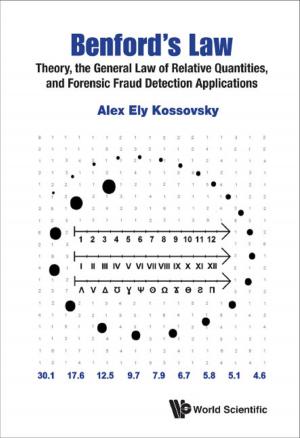The Language of Game Theory
Putting Epistemics into the Mathematics of Games
Nonfiction, Science & Nature, Mathematics, Game Theory, Logic| Author: | Adam Brandenburger | ISBN: | 9789814513456 |
| Publisher: | World Scientific Publishing Company | Publication: | February 14, 2014 |
| Imprint: | WSPC | Language: | English |
| Author: | Adam Brandenburger |
| ISBN: | 9789814513456 |
| Publisher: | World Scientific Publishing Company |
| Publication: | February 14, 2014 |
| Imprint: | WSPC |
| Language: | English |
This volume contains eight papers written by Adam Brandenburger and his co-authors over a period of 25 years. These papers are part of a program to reconstruct game theory in order to make how players reason about a game a central feature of the theory. The program — now called epistemic game theory — extends the classical definition of a game model to include not only the game matrix or game tree, but also a description of how the players reason about one another (including their reasoning about other players' reasoning). With this richer mathematical framework, it becomes possible to determine the implications of how players reason for how a game is played. Epistemic game theory includes traditional equilibrium-based theory as a special case, but allows for a wide range of non-equilibrium behavior.
Contents:
- An Impossibility Theorem on Beliefs in Games (Adam Brandenburger and H Jerome Keisler)
- Hierarchies of Beliefs and Common Knowledge (Adam Brandenburger and Eddie Dekel)
- Rationalizability and Correlated Equilibria (Adam Brandenburger and Eddie Dekel)
- Intrinsic Correlation in Games (Adam Brandenburger and Amanda Friedenberg)
- Epistemic Conditions for Nash Equilibrium (Robert Aumann and Adam Brandenburger)
- Lexicographic Probabilities and Choice Under Uncertainty (Lawrence Blume, Adam Brandenburger, and Eddie Dekel)
- Admissibility in Games (Adam Brandenburger, Amanda Friedenberg and H Jerome Keisler)
- Self-Admissible Sets (Adam Brandenburger and Amanda Friedenberg)
Readership: Graduate students and researchers in the fields of game theory, theoretical computer science, mathematical logic and social neuroscience.
Key Features:
- Focuses on epistemic game theory — an emerging approach to game theory
- Likely strong interest in these tools from other disciplines, includingtheoretical computer science, mathematical logic, and social neuroscience
- Prominent co-author team: Robert Aumann (Hebrew University, Nobel Laureate 2005); Lawrence Blume (Cornell University); Eddie Dekel (Northwestern University and Tel Aviv University); Amanda Freedeneurg (Arizona State University); H Jerome Keisler (University of Wisconsin Madison)
This volume contains eight papers written by Adam Brandenburger and his co-authors over a period of 25 years. These papers are part of a program to reconstruct game theory in order to make how players reason about a game a central feature of the theory. The program — now called epistemic game theory — extends the classical definition of a game model to include not only the game matrix or game tree, but also a description of how the players reason about one another (including their reasoning about other players' reasoning). With this richer mathematical framework, it becomes possible to determine the implications of how players reason for how a game is played. Epistemic game theory includes traditional equilibrium-based theory as a special case, but allows for a wide range of non-equilibrium behavior.
Contents:
- An Impossibility Theorem on Beliefs in Games (Adam Brandenburger and H Jerome Keisler)
- Hierarchies of Beliefs and Common Knowledge (Adam Brandenburger and Eddie Dekel)
- Rationalizability and Correlated Equilibria (Adam Brandenburger and Eddie Dekel)
- Intrinsic Correlation in Games (Adam Brandenburger and Amanda Friedenberg)
- Epistemic Conditions for Nash Equilibrium (Robert Aumann and Adam Brandenburger)
- Lexicographic Probabilities and Choice Under Uncertainty (Lawrence Blume, Adam Brandenburger, and Eddie Dekel)
- Admissibility in Games (Adam Brandenburger, Amanda Friedenberg and H Jerome Keisler)
- Self-Admissible Sets (Adam Brandenburger and Amanda Friedenberg)
Readership: Graduate students and researchers in the fields of game theory, theoretical computer science, mathematical logic and social neuroscience.
Key Features:
- Focuses on epistemic game theory — an emerging approach to game theory
- Likely strong interest in these tools from other disciplines, includingtheoretical computer science, mathematical logic, and social neuroscience
- Prominent co-author team: Robert Aumann (Hebrew University, Nobel Laureate 2005); Lawrence Blume (Cornell University); Eddie Dekel (Northwestern University and Tel Aviv University); Amanda Freedeneurg (Arizona State University); H Jerome Keisler (University of Wisconsin Madison)















